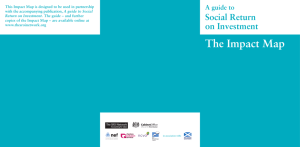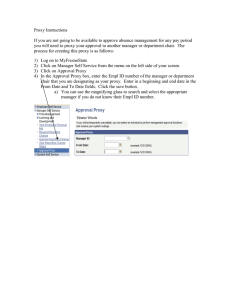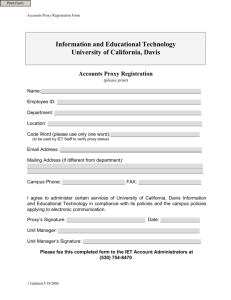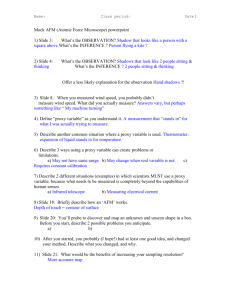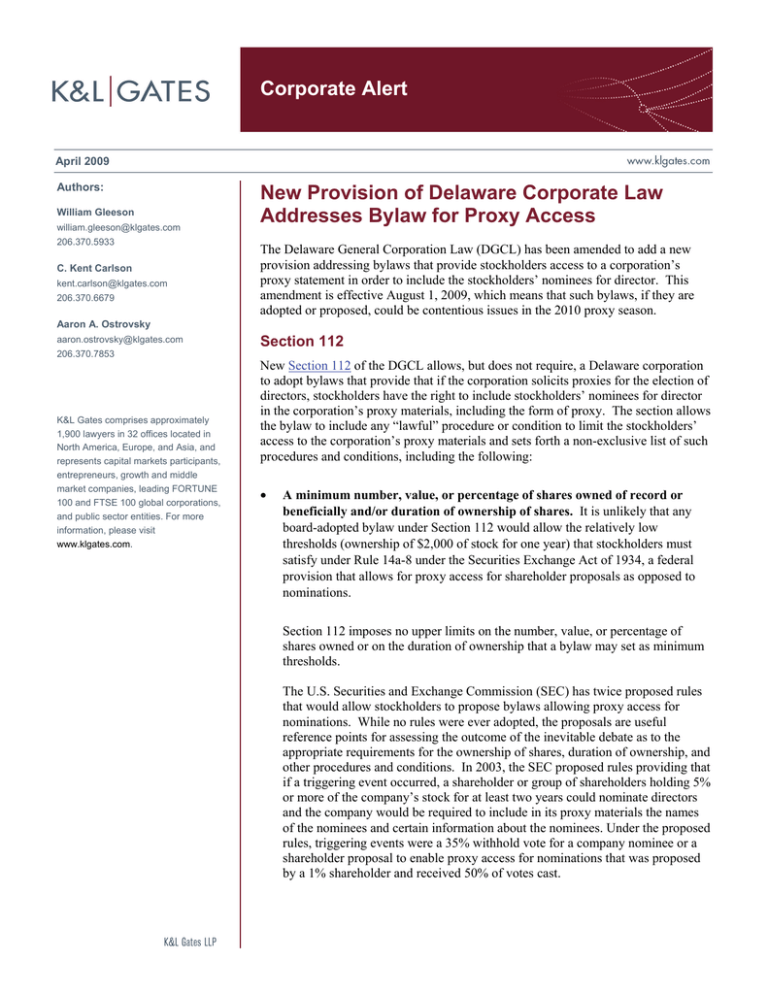
Corporate Alert
April 2009
Authors:
William Gleeson
william.gleeson@klgates.com
206.370.5933
C. Kent Carlson
kent.carlson@klgates.com
206.370.6679
New Provision of Delaware Corporate Law
Addresses Bylaw for Proxy Access
The Delaware General Corporation Law (DGCL) has been amended to add a new
provision addressing bylaws that provide stockholders access to a corporation’s
proxy statement in order to include the stockholders’ nominees for director. This
amendment is effective August 1, 2009, which means that such bylaws, if they are
adopted or proposed, could be contentious issues in the 2010 proxy season.
Aaron A. Ostrovsky
aaron.ostrovsky@klgates.com
206.370.7853
K&L Gates comprises approximately
1,900 lawyers in 32 offices located in
North America, Europe, and Asia, and
represents capital markets participants,
entrepreneurs, growth and middle
market companies, leading FORTUNE
100 and FTSE 100 global corporations,
and public sector entities. For more
information, please visit
www.klgates.com.
Section 112
New Section 112 of the DGCL allows, but does not require, a Delaware corporation
to adopt bylaws that provide that if the corporation solicits proxies for the election of
directors, stockholders have the right to include stockholders’ nominees for director
in the corporation’s proxy materials, including the form of proxy. The section allows
the bylaw to include any “lawful” procedure or condition to limit the stockholders’
access to the corporation’s proxy materials and sets forth a non-exclusive list of such
procedures and conditions, including the following:
•
A minimum number, value, or percentage of shares owned of record or
beneficially and/or duration of ownership of shares. It is unlikely that any
board-adopted bylaw under Section 112 would allow the relatively low
thresholds (ownership of $2,000 of stock for one year) that stockholders must
satisfy under Rule 14a-8 under the Securities Exchange Act of 1934, a federal
provision that allows for proxy access for shareholder proposals as opposed to
nominations.
Section 112 imposes no upper limits on the number, value, or percentage of
shares owned or on the duration of ownership that a bylaw may set as minimum
thresholds.
The U.S. Securities and Exchange Commission (SEC) has twice proposed rules
that would allow stockholders to propose bylaws allowing proxy access for
nominations. While no rules were ever adopted, the proposals are useful
reference points for assessing the outcome of the inevitable debate as to the
appropriate requirements for the ownership of shares, duration of ownership, and
other procedures and conditions. In 2003, the SEC proposed rules providing that
if a triggering event occurred, a shareholder or group of shareholders holding 5%
or more of the company’s stock for at least two years could nominate directors
and the company would be required to include in its proxy materials the names
of the nominees and certain information about the nominees. Under the proposed
rules, triggering events were a 35% withhold vote for a company nominee or a
shareholder proposal to enable proxy access for nominations that was proposed
by a 1% shareholder and received 50% of votes cast.
Corporate Alert
In 2007, the SEC proposed an amendment to
Rule 14a-8 that would allow shareholders to
include in the corporation’s proxy materials
proposals to establish proxy access mechanisms
for nominations if those proposals were
submitted by shareholders holding at least 5% of
the company’s stock for at least one year.
•
A requirement that the nominating
stockholder submit specified information
concerning the stockholder and the
stockholder’s nominees, including
information concerning ownership of the
corporation’s capital stock, or options or
other rights in respect of or related to such
stock. This provision may be seen as providing
specific support for the validity of requirements
in second generation advance notice bylaws that
the shareholder provide information beyond the
requirements of applicable federal proxy rules,
including information about derivatives and
13(d) groups, as a condition of making a
proposal or nomination at a stockholder
meeting.
•
Eligibility limitations based on the number or
proportion of directors nominated by
stockholders. This limitation in Section 112
could, and in all likelihood would, be used to
limit proxy access to “short slates” as opposed
to proxy contests for control.
•
A provision precluding nominations by any
person if such person, any nominee of such
person, or any affiliate or associate of such
person or nominee, has acquired or publicly
proposed to acquire shares constituting a
specified percentage of the voting power of
the corporation’s outstanding voting stock
within a specified period before the election
of directors. Such a limitation could be used to
prevent a stockholder from taking advantage of
proxy access if he has proposed to acquire
shares pursuant to a tender offer as a step toward
a takeover but did not do so because of the
failure of the board of directors to provide
approval under the Delaware antitakeover
statute (Section 203 of the DGCL) or to redeem
a poison pill. This limitation could also be used
to prevent proxy access by a stockholder who
has recently purchased a block (whether or not
in excess of the 15% threshold in Section 203)
with a view to pressuring the company into
selling to a third party.
State Corporate Law Precedent for
Proxy Access for Nominations
Delaware is the second state to legislate in the area
of proxy access for nominations. In 2007, North
Dakota mandated for publicly traded corporations
proxy access by statute (as opposed to, in the case
of Delaware. permitting bylaws to be adopted
requiring proxy access). The North Dakota statute
provides that a shareholder or group owning 5% of
the stock for a period of two years can include
nominees in the corporation’s proxy statement.
Under the North Dakota statute, the corporation is
very limited in the information it can require from
the shareholders and may not impose additional
conditions and procedures on the shareholder.
The Future of Proxy Access Bylaws
There are, at this point, a number of questions about
the operation and effectiveness of Section 112 that
only the passage of time can answer: Will boards
adopt bylaws in hopes of preempting stockholder
action? If so, will the board-adopted bylaws with
procedures and limitations so restrictive as to render
make proxy access unavailable in practice? Will
stockholders initiate proposals in the absence of
board action or to overrule board-adopted bylaws
deemed to be too restrictive? What types of
procedures and limitations will be acceptable to the
proxy advisors and the major pension funds? Will
such procedures and limitations be acceptable to
hedge funds or will they demand less restrictive
provisions? Will proxy access bylaws lead to a
higher level of activism regarding board
membership? Will the major pension funds become
more active in this area? Given the number of
directors appointed as a result of activist pressure or
elected in short slate contests, is a proxy access
bylaw really necessary or useful?
April 2009
2
Corporate Alert
It is likely that other states will follow the lead of
Delaware in amending the corporation statutes to
address bylaws for proxy access for nominations.
Rationale for Adoption of Section 112
Prior to the adoption of Section 112, it was unclear
under Delaware law whether stockholders could
adopt a proxy access bylaw because the Delaware
courts had not resolved the tension between Sections
109 and 141 of the DGCL. Section 109 provides
that “[a corporation’s] bylaws may contain any
provision, not inconsistent with law or with the
certificate of incorporation, relating to the business
of the corporation, the conduct of its affairs, and its
rights or powers or the rights or powers of its
stockholders, directors, officers or employees,” and
Section 141 provides “[t]he business and affairs of
every corporation organized under this chapter shall
be managed by or under the direction of a board of
directors, except as may be otherwise provided in
this chapter or in its certificate of incorporation.”
The interplay of the sections is not entirely clear and
as a result, prior to the new amendments, the
permissible areas for stockholder-enacted bylaws
were not clear.
Interplay with Rule 14a-8
Under Section 112, a proxy access bylaw can be
adopted by the board of directors or the
stockholders. Under the SEC’s current
interpretations of Rule 14a-8, a stockholder could
not take advantage of Rule 14a-8 to include in the
company’s proxy statement a proposal to adopt a
proxy access bylaw under Section 112. A
stockholder proposing such a bylaw would be
required to solicit proxies, using and paying for his
own proxy materials.
Even before Delaware’s adoption of Section 112,
there was considerable support within the SEC for
revisiting proxy access for nominations. The
adoption of Section 112 has added to impetus for
such action. The chair of the SEC has indicated that
in May, 2009 the SEC will propose several proxy
access alternatives to allow shareholders to
nominate director candidates to appear on
management proxy statements. It is likely that the
proposals will include a “direct access” rule and a
mechanism to allow shareholders to file access
bylaw proposals at companies.
K&L Gates comprises multiple affiliated partnerships: a limited liability partnership with the full name K&L Gates LLP qualified in Delaware and
maintaining offices throughout the U.S., in Berlin and Frankfurt, Germany, in Beijing (K&L Gates LLP Beijing Representative Office), in Singapore
(K&L Gates LLP Singapore Representative Office), and in Shanghai (K&L Gates LLP Shanghai Representative Office); a limited liability partnership
(also named K&L Gates LLP) incorporated in England and maintaining our London and Paris offices; a Taiwan general partnership (K&L Gates)
which practices from our Taipei office; and a Hong Kong general partnership (K&L Gates, Solicitors) which practices from our Hong Kong office.
K&L Gates maintains appropriate registrations in the jurisdictions in which its offices are located. A list of the partners in each entity is available for
inspection at any K&L Gates office.
This publication is for informational purposes and does not contain or convey legal advice. The information herein should not be used or relied upon
in regard to any particular facts or circumstances without first consulting a lawyer.
©2009 K&L Gates LLP. All Rights Reserved.
April 2009
3

